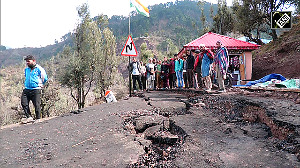It is hard to deny it this time. The government's goofed. And whatever your views on the optical abilities of the President of India (he does, after all, have a Vision 2020), he's in the right this time.
APJ Abdul Kalam is a man who takes himself seriously. He does not hesitate to point out to other less-educated Indians (especially non-resident Indians) that they owe something to India. During a recent four-day visit to the United Arab Emirates to condole the death of the Emir, he got the ambassador and the Indian embassy there to round up the Indian community at short notice, to tell them about the strides India was making and then asking them to ask him questions. The interaction went on for a couple of hours and eyewitnesses said by the end of it, the NRIs were begging to be allowed to go home.
But didacticism has its virtues. When the the Parliament (Prevention of Disqualification) Amendment Bill was sent to Kalam after being rushed through both Houses of Parliament, the President studied it long and hard, consulting a number of jurists and constitutional experts on the implications of the Bill. The government paid this no mind. It should have known better.
Since coming to power, the United Progressive Alliance government has given Kalam plenty of reasons to distrust it. The way President's Rule was imposed in Bihar (the President being sent a fax in the dead of night when he was abroad and the government expecting he would return it immediately, then implicating him in the unconstitutionality of the action) deeply embarrassed Kalam.
Worse occurred in Jharkhand where the governor, in order to ingratiate himself with Congress president Sonia Gandhi, thought nothing of compromising his own office and that of the President by swearing in Shibu Soren as chief minister, disregarding the National Democratic Alliance's claim that it had more MLAs. Only when the NDA petitioned Kalam, paraded its MLAs and Kalam summoned the Jharkhand governor to Delhi was the situation corrected.
So after all this, Kalam was taking no chances with the Office of Profit Bill. He has returned the Bill with what are now very public comments: if a constitutional impropriety was committed in the past, it was not right to justify it by passing a corrective retrospectively; and a law on office of profit must apply to all of India to prevent an anomalous situation from arising.
The government is in a bind because it recognises that the public mood is with Kalam. The President has also confided in jurists and colleagues that he expects the government to take his suggestions/advice on board and incorporate it in the Bill.
The law minister, who has drafted the Bill will have none of it. He argues that England is the mother of all Parliaments and there MPs are allowed to be consultants, directors and accept a second source of income. A law that is good enough for British MPs should be good enough for India.
While the President can only refuse assent to a Bill once, returning the legislation to him in its original form will be a huge snub.
The government says the situation is more serious than it looks. The President of India might do something drastic. And resignations are the flavour of the year -- especially when you have just another year to go as President.
How did things come to such a drastic pass? Wasn't it the NDA that let relations between Presidents and the prime minister deteriorate to a point where South Block and Rashtrapati Bhavan were talking to each other through reporters? True, Kalam was not the Congress's choice. But once your government is in power, isn't the onus upon you to have a working relationship with the President of India?
All that the Congress needed to do was indulge Kalam in some of his pet projects. Providing Urban Amenities in Rural Areas (PURA) is Kalam's brainchild. Visit him and he will whip out his laptop and guide you through a programme that is actually, quite workable. The government has adopted some part of it -- the programme to provide villages with six basic amenities (water, telephone, road, housing, and so on) is a version of the PURA scheme. But why not give the President credit for it?
Though the chances are remote, if the President of India quits office on the office of profit issue, the government will have a first-class crisis on its hands. The fact is that there is no answer to the issues the President has raised. It is hard for managers to explain to the people of India why, for instance, the speaker of the Lok Sabha should feel compelled to continue as a member of the Shantiniketan Development Board even if he draws no salary from there. He wields patronage, doesn't he?
There is a suggestion in some quarters in government that maybe there should be a one-time amnesty for past transgressions and a one-time cut-off date after which MPs and MLAs should be allowed to hold no other job. But this will mean bowing before the President -- and, to some extent, before the Bharatiya Janata Party. And then you have to decide who is more important -- the law minister or the President of India.
This President owes his job to no one. The UPA cannot deny him a house, a pension or anything else he doesn't already have. So, the Congress needs to hear what he's saying. It will ignore his suggestions at its own peril. Parliament is not always right.







 © 2025
© 2025